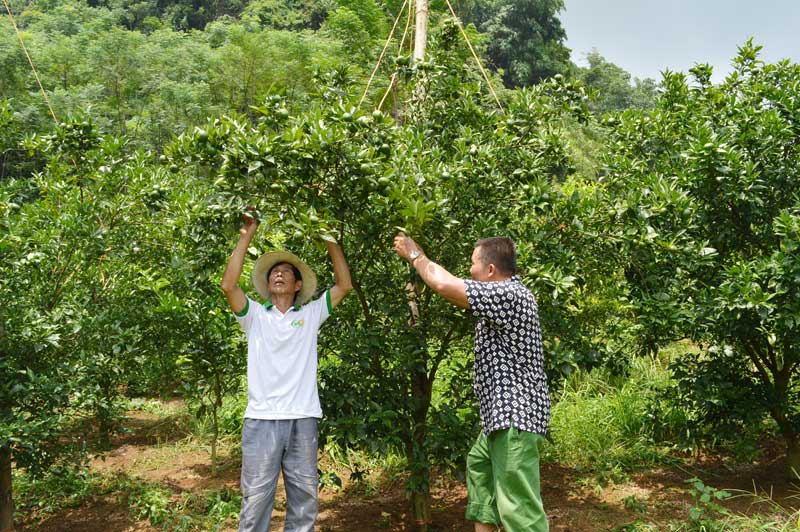
(HBO) – The Thung Rech area in Tu Son commune of Kim Boi district has seven hamlets, five of which are home to people who moved here to give land to the construction of the Da River reservoir in the 1990s. When they began settling down here, population in the area was scattered. They have built houses and farmed crops, turning this desolate land into fertile and vast sugar cane and maize fields.
Quach
Cong Tien, a resident in Kim Bac 2 (left), attends to Canh orange trees in his
orchard that covers more than 3ha of land.
It is difficult to list all difficulties and
hardships local residents have faced as well as their efforts to transform the
whole Thung Rech area into a luxuriant and fertile land. People have shifted
from farming the traditional crops of sugar cane and maize to cultivating
citrus trees. Many families have planted orange, tangerine, grapefruit and
longan trees, thus improving economic benefits and income. With their new ways
of thinking, some pioneers have developed new farming models, helping to give a
facelift to the local economy.
Ly Thi Kim, a resident in Kim Bac 4 hamlet, has
three orange gardens with more than 1,000 trees planted three years ago. She is
also farming maize, harvesting about 20 – 30 tonnes of corn each crop.
Meanwhile, the family of Quach Cong Tien in Kim
Bac 2 hamlet, a member of the Muong Dong Cooperative, has invested in a farm
covering more than 3ha of land to cultivate citrus trees. Tien said economic
benefits from sugar cane and maize farming is decreasing. If 100kg of maize
seeds could generate 200 million VND in the past, the revenue has fallen down
to around 50 million VND at present. The sale of sugar cane is also no longer
stable like it was in the past when sugar cane was sold to sugar factories.
Therefore, his family decided to invest in fruit tree cultivation. His entire
farm is now under Canh orange and Tan Lac red grapefruit trees which have borne
fruit. Since settling down here, the life of local people has become stable
with positive changes.
In spite of natural advantages such as
favourable climate and fertile soil, residents in the Thung Rech area still
face numerous difficulties. While the main road linking hamlets has been
concreted, most of other roads traversing hamlets and fields are made of earth and
being degraded, affecting travel and transport of farm produce. A water supply
system built in the area has also broken down, forcing locals to use water from
wells and springs for daily and farming activities. Due to the low per capita
income of about 10 – 13 million VND per year, the number of poor households
remains high such as 27 of the 41 households in Kim Bac 2 hamlet, or 16 of the
31 households in Kim Bac 4 hamlet. The life has been stable, but how to have
sustainably productive livelihoods is still a concern for local residents.
More than just an information technology teacher, Bui Van Nien is an inspiring figure who has nurtured the scientific curiosity and creative spirit of students in Vietnam’s ethnic minority communities.
Da Bac is the most disadvantaged mountainous district in Hoa Binh province, with ethnic minorities accounting for about 90% of its population. Over the past years, the district has mobilised resources to implement ethnic policies to improve the quality of life of local people.
In recent years, Hoa Binh province has consistently prioritised the protection, care, and education of children, particularly those from ethnic minorities and disadvantaged backgrounds, by creating a safe, healthy, and nurturing environment for their all-round development.
The Steering Committee for Tobacco Harm Prevention and Control of Hoa Binh province, in coordination with the Tobacco Harm Prevention and Control Fund, held a ceremony on May 28 in response to the World No Tobacco Day (May 31) and the National No Tobacco Week (from May 25 to 31). The event was chaired by Nguyen Van Toan, Standing Vice Chairman of the provincial People’s Committee and head of the Steering Committee.
Since 2021, the Center for Industrial Promotion and Industrial Development Consulting (CIIDC) under the Department of Industry and Trade has been implementing a school lighting model as part of the plan for using energy efficiently and economically in Hoa Binh Province in the pẻiod of 2021 - 2025. This model not only aims to improve the learning conditions and enhance the education quality, but it also promotes the message of energy saving, energy security, environmental protection and contributes to the goals of socio-economic development.
In the 2024 - 2025 school year, the entire Hoa Binh provincial education sector includes 520 educational institutions and schools. Among them are 13 ethnic boarding schools with 153 classes and 4,487 students. Four of these schools have met national standards, reaching 30.7 percent.



